1965 - Year in SF&F: Reviews
|
THE WONDER TIMELINE: SF&F RETROSPECTIVE Read other issues here ---------------------------------------------- 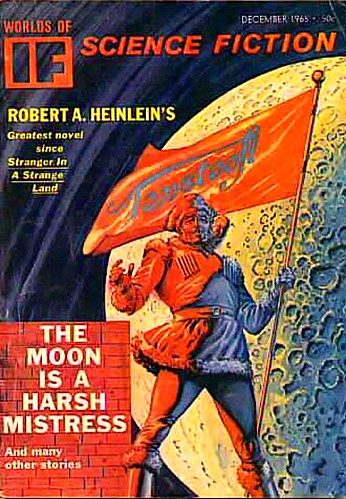 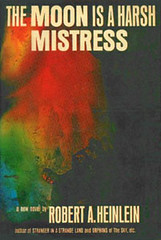 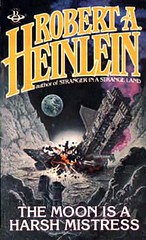 Robert A. Heinlein "The Moon Is a Harsh Mistress" (nv) © IF, Dec 1965 book: Putnam, 1966 --novel : 1966 Hugo --novel : 1967 Hugo W --novel : 1967 Nebula --all time novel : 1975 Locus All-Time Poll /8 --hall of fame : 1983 Prometheus W --all time sf novel : 1987 Locus All-Time Poll /4 --sf novel (before 1990) : 1998 Locus All-Time Poll /2 For those interested in politics, society upheavals and dynamics of power, this novel is an indispensable source to study and relish. The SF Reviews site (and most critics) gave it the highest rating as a SF classic. (read the positive review here) Classic it very well may be, but in my experience it caused a tooth ache, and put my brain on a freeze for as long as I read it. The dry, joyless narrative does not surprise or entertain (other than standard techno-SF fare and strong but one-dimensional Heinlein characters, solving the all-important questions of politics and power) I do not deny the attraction it holds for millions of readers, I just mourn the fact that it could've been written in a much livelier and more spell-binding way, given the subject. Think of what depth Frank Herbert could've brought to this harsh and fascinating Moon mining environment. Or even Clarke, with his implied vistas of wonder. None here, only the bleak, barren wastes of petty revolts, political discussions, dry dialogues, flat military action, one-dimensional and un-inspiring, like the Moon landscape itself. (Moon landscape is actually quite inspiring, it depends on how you look at it) Heinlein wrote a book that was destined to be a classic to certain people, and a "non-event" to others. Don't read it to pass time at the dentist, it will only make you more miserable. One disclaimer, though - by all means read it if you enjoy the long-winded politics and sturdy character development. Also read it just to get acquainted with a SF Classic. So that you could answer "Yes, I've read it" if anybody asks. Just don't expect it to be easy or inspiring reading. It is hard work among the bleak lunar lanscapes, soldier. 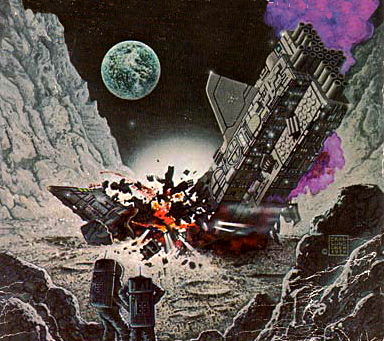 ---------------------------------------------- 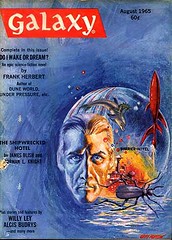 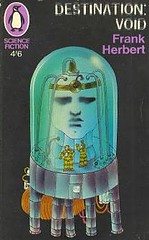 Frank Herbert "Destination: Void" (nv) (also as "Do I Wake Or Dream?") (Voidship Earthling series) © Galaxy, Aug 1965 book: Berkley /Putnam, 1966 --/ third place sf novel --/ style award --/ idea award This is one of these Frank Herbert novels, where a simple summary of the plot won't do. It's a layered cake of ideas and a scientific extrapolation on a genius level. This Wikipedia article does a pretty good job in filling us in on the plot: "In the future, humankind has tried to develop artificial intelligence, succeeding only once, and then disastrously. The project has been moved to the moon, where the scientists have cloned themselves. These clones are kept isolated and raised to believe that they are the crew of a spaceship that will colonize another planet. The spaceship will be multi-generational, needing only a crew of six, and carrying thousands of other clones in hibernation. The clone crew is really just a caretaker: the ship is controlled by disembodied human brains (known by the euphemism "Organic Mental Cores") that run the complex operations of the vessel and keep it moving in space. But the brain dies, and when the backup is awakened, it dies as well. After the second backup fails, the crew is faced with a choice: turn around, or build the computer systems that will enable the ship to continue. Their orders from the moon base are to continue at all costs; if they turn back, they will be destroyed. As the crew deals with their situation, they come to understand the dilemma they’re in: build an artificial intelligence to carry on the mission, or die" Deeply psychological and strangely fragile environment, in which scientists operate in this book, makes this book endlessly fascinating to read. Brilliance is forced to appear out of necessity, and scientific breakthroughs emerge out of sheer fear and intimidation. You could've called this novel "Under Pressure", if Herbert would've not used such title already. As it happens, this writer is best in psychological power games, and revels in "geniuses in distress" situations. The novel will tax you and strain you (some discussions may get too prolonged and obtuse), but it will also entertain. Mind-blowing dialog discusses the nature of consciousness while the action unfolds at a lively pace. Keeping in mind the year of publication, the discussion about computers is still fresh and compelling. There is also the notion of faked journey and staged conspiracy, which sheds a pall over the whole narrative, like a haunted deep note, sounding in a solemn halls of doomed intelligence. review: 10-Jul-07 (read in 1998) ----------------------------------------------  Frank Herbert "The Green Brain" (nv) (also as "Greenslaves") © Amazing Stories, March 1965 Ace Books, 1965 Unfortunately, as with many other books by Frank Herbert, the fame and success of Dune has overshadowed The Green Brain: making it another book only hardcore Herbert fans even know about. This is really unfortunate because while The Green Brain is not Dune it shares a common theme -- as well as revealing more of Herbert’s masterful skill as a storyteller. Herbert has often been called one of the first ‘ecological’ science fiction writers. True or not, his work definitely shows his concern about the health of the earth as well as man’s place in it. Dune explores that relationship, as does Hellstrom’s Hive, and – especially – does The Green Brain. Set in a comfortable familiar future, The Green Brain is about a society in open war with nature – the jungle to be exact. Needing room to expand, the world has cut, carved, burned, poisoned and smashed its way into the heart of the wilderness. The characters in The Green Brain, for the most part, are soldier/exterminators fighting guerilla infestations of weeds, roots, seeds, animals and – especially – insects, all the while pushing their native habits towards extinction. While Dune and Hellstrom’s Hive are more subtle about the ethical and moral issues surrounding man and his relationship to the environment, The Green Brain is deceptively simple: as man fights against nature, nature begins to evolve to terrifyingly fight back. ‘Deceptive’ because as with all of Herbert’s books even if the conflict is clear there are always other factors keep the story from becoming cartoonish. One of the best things about The Green Brain is the excellently-presented idea of nature, and it’s evolving intelligence, as being alien yet familiar, like it’s a different side to the earth’s own mind – a different side that’s more than a little irked that humanity continues to be insanely stupid about not maintaining a respectful balance with it. Part of that anger, coupled with nature’s superb adaptability, comes out in the jungle’s new weapon: a collaborative hive of insects that excellently mimic what’s threatening them: us … human beings. Yes, The Green Brain is not Dune but it’s still an excellent read and well worth picking up – as it everything else by Herbert. And, who knows, maybe you’ll start looking warily at insects … or people with very, very green eyes... Review by M. Christian ---------------------------------------------- 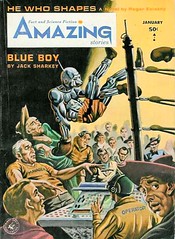 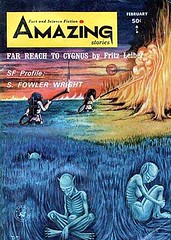 Roger Zelazny "The Dream Master" (nv) (exp. from "He Who Shapes") © Amazing, Jan 1965 book: 1966, Ace Books --novella : 1966 Nebula W (tie) --novella : 1999 Locus All-Time Poll /14 --/ third place sf novel --/ wonder award --/ style award --/ idea award --/ emotion award A very important novel, a triumph for the new imaginative style, one of the most readable examples of the "New Wave" and a great testament to the psychedelic era. The dream-like quality of Zelazny's writing envelopes the reader and satisfies in itself, not much concerned with action, plot, or even with characterization. How can that be, you may ask? Because this novel is one step short of poetry, one bite short of a spaced-out mushroom experience, one chord short of Hendrix' guitar solo - take any number of other authentic sixties art experiences and translate it into writing. But it is not to be analyzed for plot and structure. It's loosely about a psychoanalyst, and a mechanic (Shaper) of dreams. In a warm womb of metal, his patients dream their neuroses, while Render, intricately connected to their brains, dreams with them, makes delicate adjustments, and ultimately explains and heals. Things go wrong in the human mind, and Zelazny plots the doomed rollercoaster of imagery without any point, or destination - "art for the sake of art only". review: 10-Sep-06 (read in 1989) -------------------------------------------- Return to the Wonder Timeline Labels: Timeline |
Click to go to "Dark Roasted Blend" site

|
Collecting Pulp Magazines Ephemera Interview with Avi Abrams |

|
Enchanting Victorian Fairy Tale Art "Then world behind and home ahead..." |

|
Exceptional British Scifi Artwork from the 1950s Space Pulp Art by Ron Turner and other British artists |

|
Pulp Pleasures: Eando Binder Great space adventure fiction from the 1930s "Where Eternity Ends" and other rare gems |
Also read recent posts:
Author's Pen Names - Most Complete List Ever
The Wonder Timeline: SF&F Restrospective
Space Adventure Article
|
"SF&F Reading Experience" is part of "Dark Roasted Blend / Thrilling Wonder" family of sites. We try to highlight the most entertaining and rewarding science fiction and fantasy, with emphasis on memorable reader experience, not necessarily general acceptance by the critics. Have fun, and delve into our extensive ratings and reviews! Most reviews are written by Avi Abrams, unless otherwise noted. Reviews also appear on our unique historical retrospective page Wonder Timeline of Science Fiction. Feel free to submit your own review, if a particular story is not listed here. All major OFFICIAL AWARDS are highlighted in BLUE ("winner" has a letter "W" by it, otherwise it is a runner-up only) Our PERSONAL AWARDS (ratings) are highlighted in RED and PURPLE: --/ first place : --/ second place : --/ third place : --/ fourth place : --/ cool : (equal to fifth place) ALL "BEST OF" LISTS ARE LOCATED HERE These awards are given in the following categories: - novel : - series : - novella : - story : - collection : Also, there are our personal STYLE / GENRE SPECIFIC AWARDS. These reflect the story's content and the lasting impression on the reader: --/ wonder award sense-of-wonder, "visual intensity" and inventiveness --/ idea award originality of idea / concept --/ adventure award exhilarating plot, excitement / action --/ style award outstanding literary qualities, inimitable style --/ romance award intense and beautiful love / relationships --/ humour award funny and cool --/ emotion award touching, lasting impression, sensitivity --/ shock value altogether wild --/ awesome scale mind-boggling; further enhances sense-of-wonder --/ rare find very hard to locate, mostly from old pulps, never reprinted, etc. Again, please feel free to leave your own review or comment under every writer's entry; also recommend us other stories you liked. |

0 Comments:
Post a Comment
<< Home